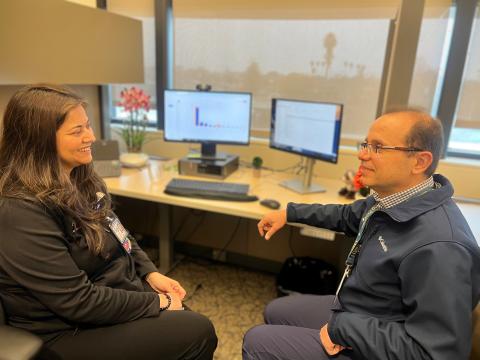UCSF Fresno: 50 Years Origins Story


Photo Credit: Rowell family
The UCSF School of Medicine regional campus in Fresno (UCSF Fresno) has its roots in a historic Fresno figure. Milo E. Rowell, a World War II lawyer who contributed to drafting Japan's revised constitution after the war, returned to Fresno to practice law and later became a leader in the grassroots movement to bring the UCSF medical education program to the San Joaquin Valley.
Today, Rowell would be pleased to see UCSF Fresno hosting annual commencements for over 100 residents and fellows. Many of these graduates choose to remain in the Valley, serving as physician leaders who provide high-quality patient care, conduct clinical research to improve health and wellbeing, teach future generations of physicians, and continue their medical education.
Rowell's commitment to a well-trained physician workforce was influenced by his childhood, spent with his granduncle, Chester Rowell, MD, a prominent Fresno physician and the first president of the Fresno County Medical Society. Dr. Chester Rowell also served as Fresno's fourth mayor and was a California state senator. After his death in 1912, the community honored him with a statue in Courthouse Park.
In 1970, Milo Rowell was appointed chair of the San Joaquin Valley Health Consortium, established to build on a Carnegie Commission report recommending Fresno for a University Health Science Center. In 1972, Rowell and Consortium members testified at a California Assembly Select Committee on Health Manpower alongside UCSF's Associate Dean William Reinhardt, MD, who highlighted the collaboration between UCSF and the Fresno VA hospital.

The Commission’s report helped the consortium to successfully apply for federal funds to establish an Area Health Education Center (AHEC) in the central San Joaquin Valley to support health professions training. From there, the consortium pursued a UC medical education program for the Valley, leading to a formal affiliation with the Veterans Administration in June 1975, which included $2 million for a new UCSF medical education building at the Fresno VA hospital.
Today, residents and fellows at UCSF Fresno rotate at the VA from the Department of Family and Community Medicine, the Department of Medicine, Psychiatry, and Oral and Maxillofacial Surgery, providing care for more than 25,000 veterans each year.

In recognition of his contributions, Milo Rowell received a UCSF Medal in 1976, the University’s highest honor. He passed away in 1977, and in 1981, the medical education building at the Fresno VA Hospital was named in his honor.
“UCSF Fresno was established with a clear mission: to serve the public by addressing the health care needs of an underserved population in a region facing a critical shortage of physicians,” said Talmadge E. King, Jr., MD, Dean of the UCSF School of Medicine. “UCSF Fresno’s commitment to excellence in patient care aligns with its dedication to training the next generation of health care leaders. UCSF Fresno strives to make a lasting impact on the health of the San Joaquin Valley through excellence in teaching, patient care, innovative clinical research, and community partnerships. The institution emphasizes a culture of empathy and mutual respect, promoting equitable access to education and opportunity.”
Milo Rowell witnessed the beginnings of a medical training center in the Valley, but today, he would be impressed by its growth and impact. The UCSF School of Medicine Fresno campus, established in 2005 in downtown Fresno, is the largest academic physician training program between San Francisco and Sacramento to the north and Los Angeles to the south.
In 1979, a group of physicians employed by Fresno County came together to start the Central California Faculty Medical Group, now known as Inspire Health Medical Group. Today, UCSF Fresno boasts more than 200 core faculty members, many are in the medical group, and an additional 300 physicians with volunteer appointments train residents in eight medical specialties: Family and Community Medicine, Emergency Medicine, Internal Medicine, Pediatrics, Obstetrics and Gynecology, Orthopaedic Surgery, Psychiatry, and Surgery, along with a dental residency in Oral and Maxillofacial Surgery. The campus also offers advanced training in 20 sub-specialties.
“Graduates of our program are providing care in hospitals, clinics, and community health centers from Bakersfield to Sacramento, and throughout the state and nation,” said Stacy Sawtelle Vohra, MD, Assistant Dean for Graduate Medical Education at UCSF Fresno. “Our residents and fellows develop a deep commitment to our community, and 41% of our core faculty are graduates of our residency and fellowship programs.”
Although UCSF Fresno was initially focused on graduate medical education, it began training medical students in the 1990s through the Model Fresno program, which evolved into the Longitudinal Integrated Fresno Experience. These initiatives laid the groundwork for today’s comprehensive undergraduate medical education.
UCSF Fresno has also been at the forefront of helping prepare middle and high school students and, most recently, community college and university students for medical careers through various pathway programs. Its decades-old Doctors Academy and Junior Doctors Academy for high school and middle school students in Fresno and Caruthers are admired state and nationwide.
UCSF Fresno is committed to improving health for all by providing high-quality patient care, education, and research while collaborating with community partners to address health care disparities. The campus has established affiliations with numerous health care organizations, such as Inspire Health Medical Group, Family HealthCare Network and Community Health System including Community Regional Medical Center, the largest acute-care and trauma hospital in the central San Joaquin Valley. These partnerships enrich the learning environment for trainees. Over the past five decades, UCSF Fresno has evolved to meet the region's needs and develop a physician workforce that reflects the diverse communities in the Valley.
“It is hard to overstate the impact of the University of California, San Francisco, on the quality of health care in the Valley. It is the stamp of UCSF,” said John Blossom, MD, a UCSF faculty emeritus in Family and Community Medicine and a member of the UCSF School of Medicine Class of 1970. Dr. Blossom completed his Family Medicine residency at UCSF Fresno in 1974 and joined our faculty in 1976, serving in various leadership roles.
Special thanks to The Heritage Center, Fresno County Public Library; UCSF Library, Archives & Special Collections; UCSF Fresno Hildebrand Medical Library; Professor Emeritus John Blossom, MD; retired UCSF Fresno Risk Manager Hilary Ross; Community Health System; Family HealthCare Network; Fresno VA; Inspire Health Medical Group, and all of our valued clinical partners; and our elected officials for their ongoing support and leadership.
UCSF Fresno Cystic Fibrosis Center Is Only Combined Adult-Pediatric Center in the Valley
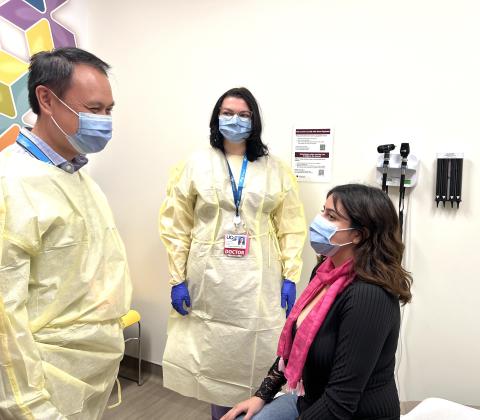
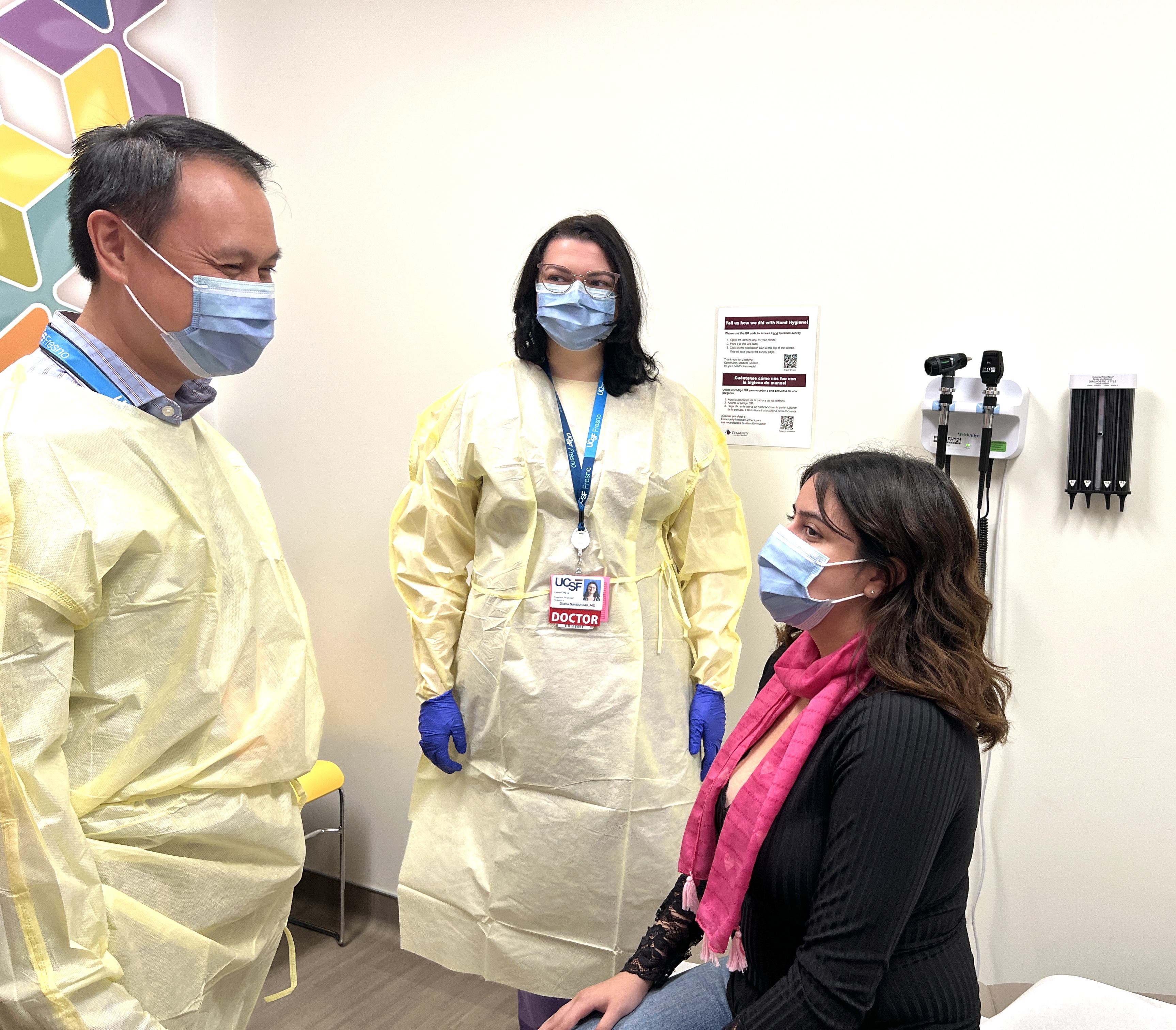
In 2016, UCSF Fresno opened a cystic fibrosis center where adults are as welcome as newborns.
The UCSF Fresno Cystic Fibrosis (CF) Center in downtown Fresno is the only combined adult and pediatric CF center in the San Joaquin Valley that is nationally accredited by the Cystic Fibrosis Foundation.
The age range of patients seen at the center is remarkable.
CF is a progressive genetic disease that used to be a disease in children. Three decades ago, a baby born with CF had a life expectancy of about 30 years, but advancements in medications and treatments have significantly increased life expectancy. In 2024, the median age of survival for a newborn with CF is 61 years.
CF symptoms and how severe they are can vary from person to person. The disease affects the lungs, pancreas and other organs of the body. Secretions can lead to lung infections, disrupt the digestive system so that the body does not absorb food and nutrients, and block the bile duct in the liver.
Providing a continuum of care from infancy to adulthood for people with CF is needed more than ever, said Anil Ghimire, MD, a UCSF associate clinical professor and an Inspire Health pulmonologist who sees adult patients. “The number of adults with CF is going to grow, and the Valley will have a significant number of adults with CF. So, there is a need, and we are here to help. We are the only accredited CF center that can provide care to adults with CF locally.”
Paul Do, MD, a UCSF associate clinical professor, medical director of the UCSF Fresno CF Center, and an Inspire Health pediatric pulmonologist, said, “The great thing about our center is that once our pediatric patients turn 18 or 21, we can transition them to the adult program where they can continue seeing the same team and getting the same care.”
Abigail Treadway, 23, appreciates having the UCSF Fresno CF Center in the Valley. “It’s very important,” she said. “I’ve had several doctors in the past who don’t understand how CF works, and they would say one thing, and you know, even as a child, I would know that is not how my body works.”
Abigail said the medical team at the UCSF Fresno CF Center understands CF and what patients experience. “It makes it so much easier to be able to find the solutions that you’re wanting because you’re not having to try and find ways to explain the problem.”
This fall, UCSF Fresno hosted a Cystic Fibrosis Family Education Day for pediatric and adult patients and their families. It was a day for sharing information, the latest developments in treatments and medications, as well as a day for community building. Having people who have similar experiences share their experiences “is therapeutic and helpful for them,” Dr. Ghimire said. CF is a chronic disease, and a single person needs a community for support, he said. The CF Education Day creates a sense of community as we are all a group of people with the same mission to help people with CF.
The event also increased awareness of the UCSF Fresno CF Center. The center has an interdisciplinary team of Community Health System employees that includes a coordinator, respiratory therapists, a registered dietician, a pharmacist, a physical therapist, and a social worker. The center provides sweat chloride testing, complete pulmonary function testing, cardiopulmonary stress tests, bronchoscopy, and high-resolution CT scans. It can perform lung function testing on children less than five years of age with impulse oscillometry studies.
“We just want people to know we are here to provide that care,” Dr. Ghimire said. “And we provide the same level of care as other centers.”
Partnership with UC Merced boosts successful grant applications, publications and presentations
Biostatistics are essential to research projects at UCSF Fresno. An arm of statistics, biostatistics are used to interpret medical data to prove or disprove a hypothesis and credibly communicate research findings in a way that meets the standards for publication in peer-reviewed journals. For faculty, fellows, residents and medical students who engage in research at UCSF Fresno, the Clinical Research Center offers biostatistical support that includes:
- Assistance in clinical research design
- Guidance on data collection, quality control and database construction
- Guidance with database management and coding of variables, and
- Assistance with data analysis
Two types of biostatistical support are available 1) in-house and 2) offsite through a partnership with UC Merced’s Biostatistics and Data Support Core Center.
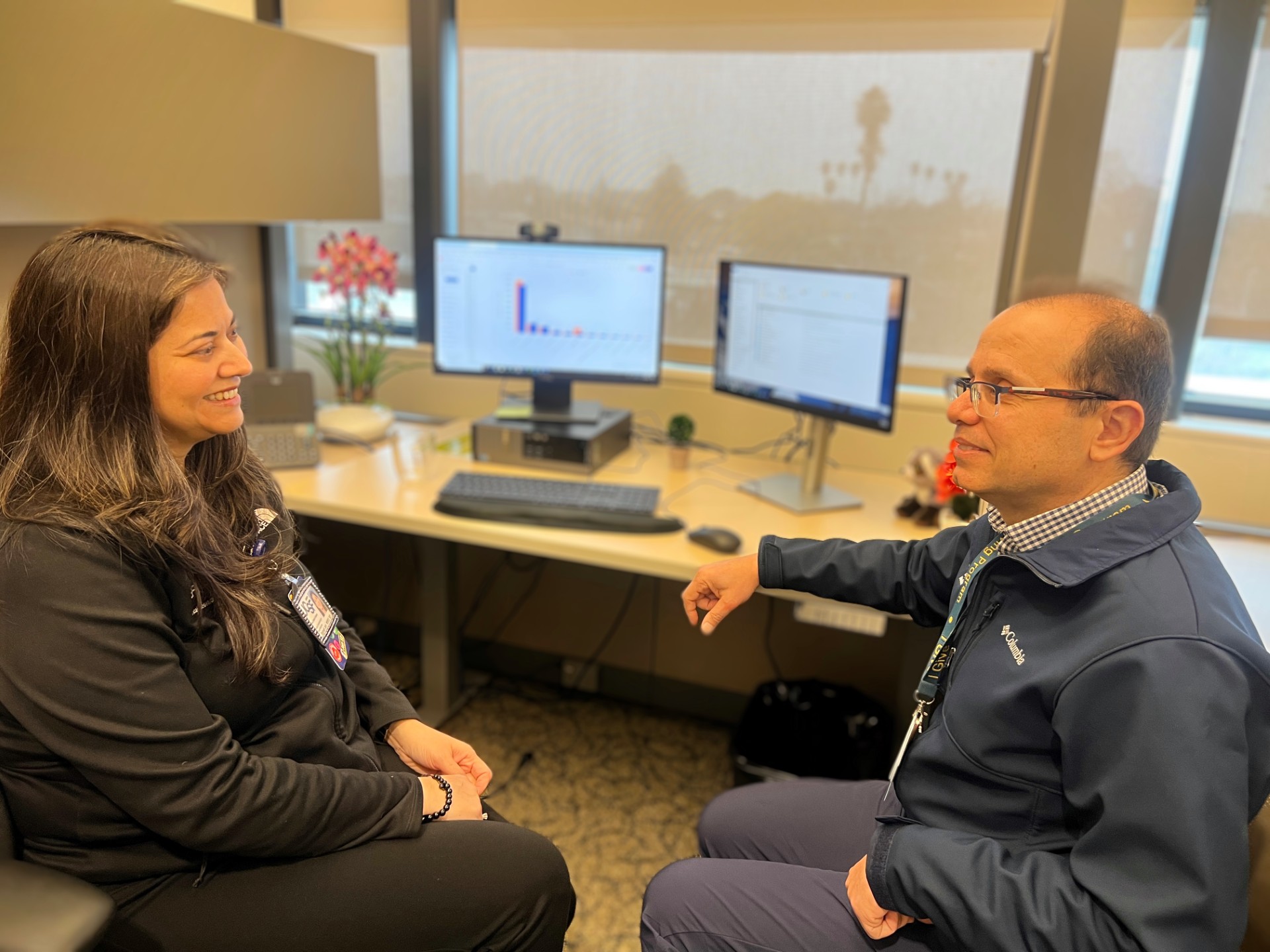
“Biostatisticians are trained to tease out information in a way that separates fact from coincidence and present it in a scientifically acceptable manner,” said Eyad Almasri, MD, assistant dean for Research at UCSF Fresno. “We offer the necessary support in-house and through a unique bidirectional partnership that taps into the expertise of faculty at our sister UC institution and provides UC Merced graduate students with education and real-world experiences.”
UC Merced’s Biostatistics and Data Support Core Center provides a multitude of services including comprehensive statistical and data analysis support to help researchers analyze complex data. To meet the need for support and complexity of projects at UCSF Fresno, the partnership with UC Merced was established in 2018.
“We provide roughly 90 to 100 hours per month of consulting work to clinicians and residents, and we have worked on a wide variety of projects, from assessing the association of diabetes and Valley fever to describing whole blood use in Emergency Department settings,” said Alec Chan-Golston, PhD, assistant professor of Public Health at UC Merced and director of the Health Sciences Institute Biostatistics and Data Support Core Center. “This has been an incredible and successful collaboration, resulting in numerous publications and presentations at national conferences.”
“Working closely with UCSF Fresno clinician researchers to support their projects was a top priority when I founded the Core and establishing a solid relationship with their departments is one of the things I'm most proud of,” said Sidra Goldman-Mellor, PhD, MPH, associate professor of Public Health at UC Merced and founding director of the Biostatistics and Data Support Core Center. “The collaborative work between the Biostats Core and UCSF Fresno researchers has resulted in numerous publications, grant applications, and has been a productive and scientifically rewarding experience for both parties.”
On-site support at the UCSF Fresno Clinical Research Center (CRC) has assisted with various projects including a study investigating whether radiographic characteristics can distinguish lung nodules due to coccidiomycosis (Valley fever) from those caused by lung cancer or an investigation looking at predictors of COVID-19 infection outcomes in patients with non-alcoholic fatty liver disease, among others.
“Residents, fellows, faculty and even SJV PRIME medical students come to the CRC for help with designing studies, inputting and analyzing data and reviewing abstracts,” said Ratnali Jain, MBBS, MS, with the Clinical Research Center. “This biostatistical support enables researchers at UCSF Fresno to publish and present their data.”
UCSF Fresno was established 50 years ago with a clear mission to respond to the severe shortage of physicians in California’s San Joaquin Valley and to address the health needs of the region. As a clinical campus of the UCSF School of Medicine, UCSF Fresno accomplishes these goals through a fourfold mission of medical education, patient care, research and community partnerships. Addressing health issues specific to Valley communities is a research priority.
The establishment of the Clinical Research Center in 2013 consolidated research at UCSF Fresno into one facility. The addition of services in recent years enabled the CRC to take on more clinical trials, including being the first study site in some national and international trials. The CRC also is uniquely positioned to effectively manage outpatients with infusion and other functions as well as meet the needs of study participants with language and transportation barriers by taking follow-up visits directly to participants in outlying communities.
Researchers at UCSF Fresno looking for biostatistical support should contact the Clinical Research Center via the Biostats Request Portal or for information about clinical trials currently available at the CRC, email [email protected]
UCSF Fresno Marks 35 Years of Caring for Alzheimer’s Patients and Supporting Their Families
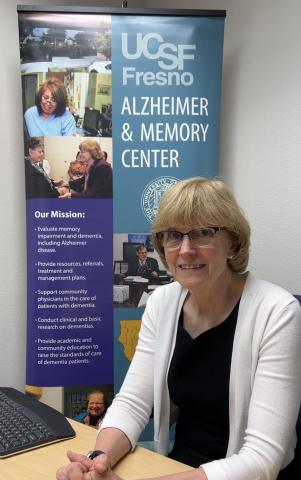
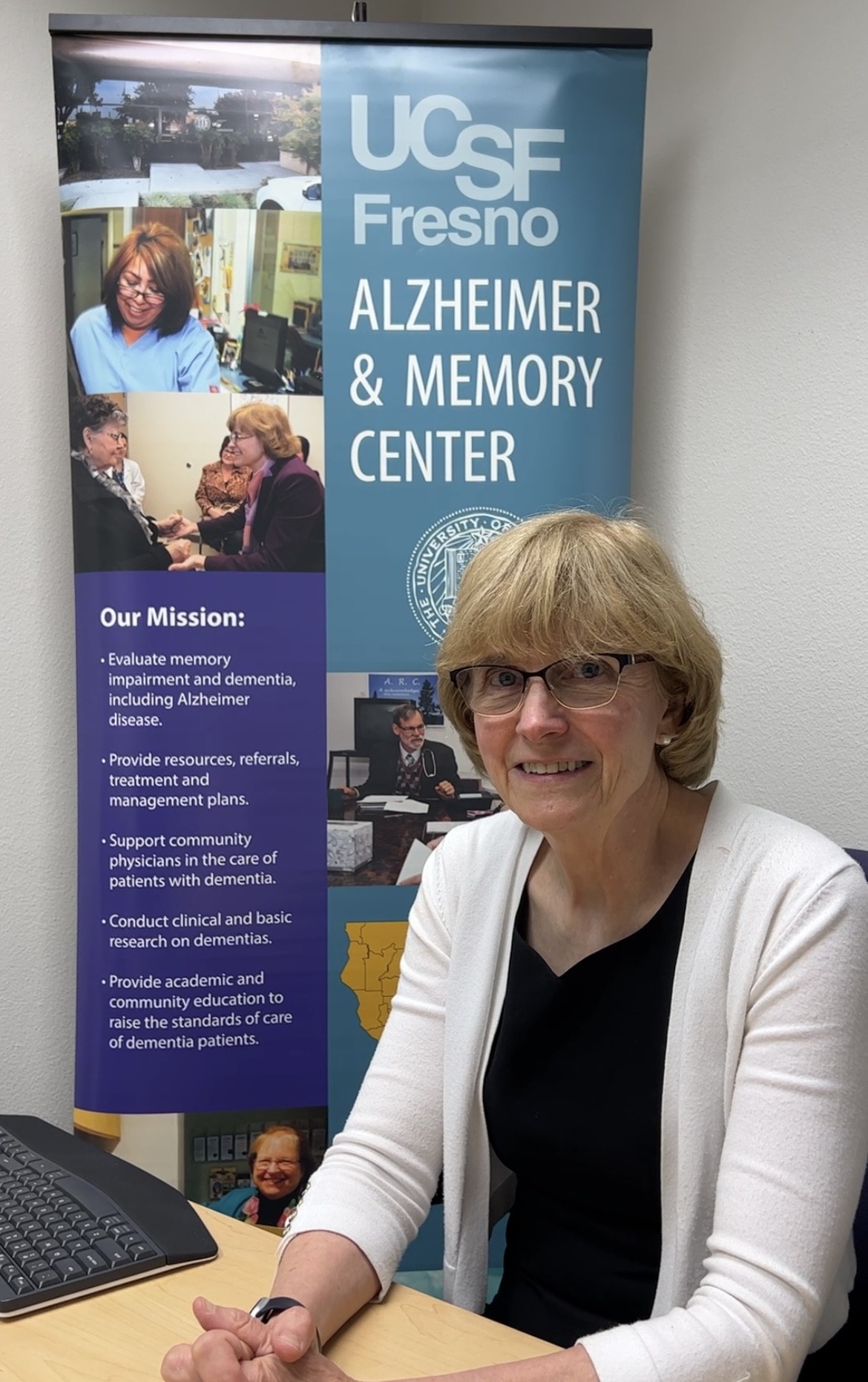
The UCSF Fresno Alzheimer & Memory Center celebrated 35 years of providing dementia care and support services to patients and families in the San Joaquin Valley in 2024. As one of 10 centers of excellence in California, it conducts evaluations, makes diagnoses, treatment plans, and referrals to community resources for people with dementia and their families.
As the only center in the central San Joaquin Valley, the center provides services in Fresno, Kings, Madera, Merced, Mariposa, Tulare, Stanislaus, San Luis Obispo and Tuolumne counties – an underserved part of the state.
“The presence of a California Alzheimer’s disease center in the San Joaquin Valley is significant because it raises the profile of Alzheimer’s disease and related dementias,” said Loren Alving, MD, a UCSF professor of Neurology and director of the UCSF Fresno Alzheimer & Memory Center (AMC).
Dr. Alving credits John Blossom, MD; David Ira Margolin, MD, PhD; and Glen Caspers Doyle, NP, PsyD, for applying for and receiving funding from the state in 1989 to create the UCSF Fresno Alzheimer & Memory Center. Dr. Blossom, a UCSF professor emeritus, was at that time chief of the Department of Family and Community Medicine at UCSF Fresno. Dr. Margolin, a neurologist, was a UCSF faculty member and chief of neurology at the Veterans Administration hospital in Fresno; and Doyle (now deceased) was director of Fresno State’s gerontology program. Linda Hewett, PsyD., a retired UCSF associate professor, neuropsychologist and former co-director of the AMC, also was critical in the early years in ensuring the continued existence of an AMC in the Valley.
The State of California partially supports the AMC with grant funding and private donations. AMC welcomes tax-deductible donations, which are used to support patient care, education and research.
“The state of California investing in these centers was a very good investment,” Dr. Alving said. “Certainly, our center, though it’s physically isolated from other academic centers, has benefitted from the colleagues and our interactions at the state centers to bring a level of expertise in dementia to the San Joaquin Valley.”
Mario Peña, regional director of the California Alzheimer’s Association, said the organization is working “to ensure the state's California Alzheimer's Disease Centers (CADCs) are adequately funded and have partnered with all 10 sites on joint outreach to lawmakers to highlight their important role in fighting the disease.
“We are out in the community, connecting with public policy efforts, and it's essential to have these resources in our local communities,” Peña said. “The aim is to ensure residents have access to treatment and a diagnosis, and we're happy to have that in Fresno. We hope to work with the state and expand these efforts and opportunities in other needy areas."
UCSF Fresno’s AMC collaborates with programs locally and across the state related to Alzheimer’s and dementia care, including the state’s Dementia Toolkit Program, which gives primary care physicians information about clinical interviews and an interpretation guide for making a confident diagnosis of Alzheimer’s disease and making a referral when necessary.
“We train our UCSF Fresno residents in Family and Community Medicine; we train residents in Psychiatry; and we train medical students in the care of dementia patients in the hopes that when they go out and practice, they will have that fundamental knowledge about how to take care of these patients,” Dr. Alving said.
The need for services for Alzheimer’s patients and their families is increasing. The most recent data shows 64,400 cases of Alzheimer’s disease in people 65 and older in the Valley and 719,700 Californians aged 65 and older with Alzheimer’s. A recent report from the Alzheimer’s Association said cases in California will increase by more than 20% between 2020 and 2025.
“There is no way neurologists, and particularly those who specialize in Alzheimer’s disease can see all the patients who come down with Alzheimer’s disease in the coming years,” Dr. Alving said, “and having a well-educated workforce is extremely important, and is one of the things that we focus on.”
The UCSF Fresno AMC has a multidisciplinary team that consults with patients and their families. The team includes Dr. Alving, Jason Gravano, PhD, a neuropsychologist, and AMC Co-director Alex Sherriffs, MD, a UCSF professor and a Family and Community Medicine physician specializing in geriatrics.
“The most important thing the center does is the family conference,” Dr. Sherriff’s said. “It is an opportunity to share the multidisciplinary team’s conclusions with the patient and the family to help them map out ongoing management plans and follow-up. And the work the center does in connecting families to community resources is critical.”
The UCSF Fresno AMC is working with the state to create a training program for caregivers in Northern California. The goal is to have educational materials for people to access in their own time to try to get connected to the right places while avoiding real barriers, so they do not have to attend a training program at a specific time, Dr. Gravano said.
Another focus is the community. The AMC trains local providers and institutions about vulnerable and underserved persons with dementia and does outreach to underserved populations, including the LGBTQ+ community and the Latinx community; and the center collaborates with partners in the community to hold an Alzheimer’s Caregiver Conference twice a year, once in English and once in Spanish.
“We work with the Valley Caregiver Resource Center, a local organization providing information and resources to caregivers. It is usually one of the most important referrals we make when patients come to our center,” Dr. Alving said. The AMC also works with the Alzheimer’s Association, which has a branch in Fresno. It is with those two partners that the AMC puts on the Caregivers Conference.
“We feel that a well-educated caregiver or caregiving family is the most important thing for a patient with dementia,” Dr. Alving said.

UCSF Fresno’s success and growth are a direct result of the dedication and inspiration of our faculty, staff, residents, fellows, students, alumni, partners, donors and friends. In each issue of Focus, we introduce you to the people who contribute to the greatness of UCSF Fresno through informal interviews.
In this issue, we feature Stacy Sawtelle Vohra, MD, UCSF Fresno Assistant Dean for Graduate Medical Education (GME) and Designated Institutional Official (DIO), who served in these roles in an interim capacity since the Fall of 2022 and was appointed in September 2024.
Dr. Sawtelle Vohra began her career at UCSF Fresno in 2010 as an attending physician in the Department of Emergency Medicine. For the past 12 years, she has been part of the Emergency Medicine Residency Program leadership team and served as the Program Director from 2017 to 2024.
What is your hometown?
I grew up in Delavan, Wisconsin, a small town in southeastern Wisconsin. It is growing and the population is now over 8,500.
Where did you go to High School? Undergrad?
I went to Delavan-Darien High School. Go Comets! My graduating class had just over 150 students. I went to the University of Wisconsin-Madison for both college and medical school. Our Interim Chief of Pediatrics Christine Nelson, MD, and Lin Li, MD, Associate Director for the UCSF San Joaquin Valley Program in Medical Education (SJV PRIME) are also alumni from the University of Wisconsin School of Medicine and Public Health. My undergraduate majors were in Spanish and Microbiology.
Why did you choose UCSF Fresno in 2010?
I first learned about UCSF Fresno during my residency training at UCLA. My co-residents raved about their educational experiences as medical students rotating in the Emergency Department. Through a little research, I learned that the UCSF Fresno Emergency Medicine (EM) Residency Program was one of the first EM programs established in the western United States and that there were quite a few UCLA residency graduates working as faculty in Emergency Medicine at UCSF Fresno. UCSF Fresno was held in high regard by everyone I talked to and once I learned about the extraordinary communities in the Central Valley, I knew it would be an ideal place for me to start my career. I have benefitted from tremendous mentorship over the years at UCSF Fresno and appreciate the varied opportunities available to develop as a clinician educator.
Why did your current position at UCSF Fresno appeal to you?
I am deeply motivated by our mission to train physicians to care for the diverse communities in the Central Valley. Our medical education programs elevate the quality of health care and expand access within our community. Further strengthening and growing our already exceptional graduate medical education programs has tremendous potential to further our positive impact on the health of our community.
Why is teaching important to you?
Working with residents, fellows, and medical students at UCSF Fresno is incredibly rewarding. I value the collaborative nature of teaching and learning in medicine. Over the past 14 years, I have learned a great deal from my patients, faculty colleagues, the trainees and students I have worked with, and the extraordinary clinical staff at Community Regional Medical Center where I work in the Emergency Department. In addition to developing expertise within one's field, I strive to equip our future physicians with the tools that will help them thrive in their careers. Learning to navigate difficult situations, learning from mistakes, and cultivating resiliency are critical skills for our trainees to develop.
What are the most rewarding aspects of your job?
I love our team-based approach to care in the Emergency Department and greatly appreciate the shared commitment to medical education between UCSF Fresno and all our clinical partners. One of the most rewarding aspects of graduate medical education for me is when our trainees choose to start their faculty careers at UCSF Fresno or go out into the community to continue to serve the Central Valley.
What do you like to do in your off time?
My time outside of work is filled with my kids' activities. I love watching their school concerts and cheering them on at their sporting events.
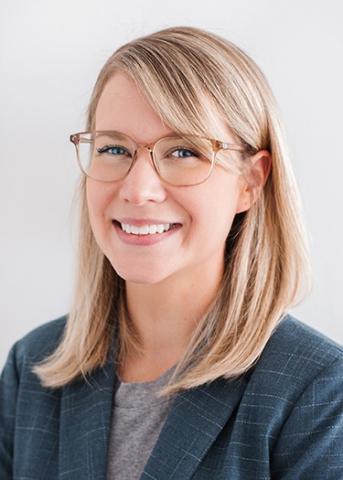
Over the last 50 years, UCSF Fresno has trained thousands of dedicated physician leaders to provide innovative and excellent patient care and advance patient-centered research.
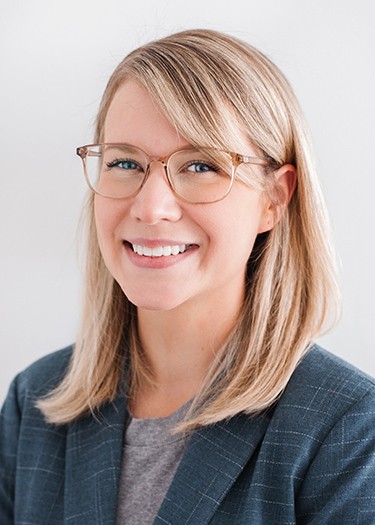
Each year, we proudly celebrate excellence in medical training by recognizing an exceptional first-year Internal Medicine resident (intern) who shows exceptional growth as a physician and exemplifies dedication, compassion, and an unwavering commitment to learning. This past year, we honored Katherine Jones, DO, with the UCSF Fresno Department of Medicine’s Eloise Thompson Outstanding Intern of the Year Award.
This special award was established to honor Eloise Thompson, who dedicated 18 years of service to UCSF Fresno’s Internal Medicine Residency Program. Following her passing in 2016, the award became a lasting tribute to her dedication to the program’s mission to recruit and train the best and brightest physicians for Central California and beyond.
Dr. Jones grew up in Camino, California, a small town about halfway between Sacramento and South Lake Tahoe. She earned her undergraduate degree at UC Berkeley and her medical degree from Liberty University College of Osteopathic Medicine in Virginia. Now in the second year of the three-year Internal Medicine Residency, Dr. Jones continues to exemplify the qualities this award celebrates.
Dr. Jones shares her reflections on her path to residency and the inspiration she draws from her colleagues and experiences at UCSF Fresno.
“I remember rotating at UCSF Fresno as a fourth-year medical student," said Dr. Jones. “During that time, I realized this is where I wanted to be. To me, UCSF Fresno means community; the people here are what make this place so special. I know this is where I can learn, collaborate, and feel supported in my journey as a resident. I feel so fortunate to be a part of such a wonderful group of individuals as I continue my training as a physician.”
When asked to share her most memorable experience as a first-year resident, Dr. Jones replied, “I had so many memorable experiences, but what stands out most is the time I spent with my co-residents at retreats and conferences, during simulation sessions, and working together on rotations. I also appreciate the cross collaboration between specialties. Learning from this diverse group of faculty and trainees is what makes UCSF Fresno so unique.”
As an example of this cross collaboration, Dr. Jones joined forces with residents and fellows from a variety of specialties to support the Sixth Annual UCSF Fresno Liver Expo, organized under the leadership of Marina Roytman, MD, UCSF clinical professor and director of the Hepatology Fellowship Program at UCSF Fresno. This free event for the community provides attendees with valuable information about liver health including free FibroScan assessments and hepatitis testing and exemplifies the vital role of dedicated medical professionals like Dr. Jones in community outreach and preventative care.
When discussing her future aspirations, Dr. Jones said, “I hope to pursue a fellowship in Gastroenterology. I'm passionate about advocacy for the inflammatory bowel disease (IBD) community and in the future, I would love to work with this patient population.”
Dr. Jones is grateful to the supporters of the Eloise Thompson Award Fund. “Thank you for continuing to support residents in our journey to learn and care for patients,” she expressed. “Your kindness is another example of how this community strives to support one another.”
We invite you to join us in fostering the growth of the next generation of outstanding physicians like Dr. Katherine Jones by making a gift to the Eloise Thompson Award Fund or to the UCSF Fresno fund of your choice.
For additional information on how you can influence the future of medical education and health care in the San Joaquin Valley, please contact Kathleen Smith, UCSF Fresno associate director of development, at 559-499-6426 or [email protected].
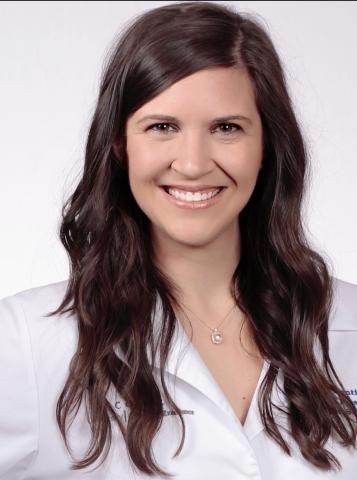
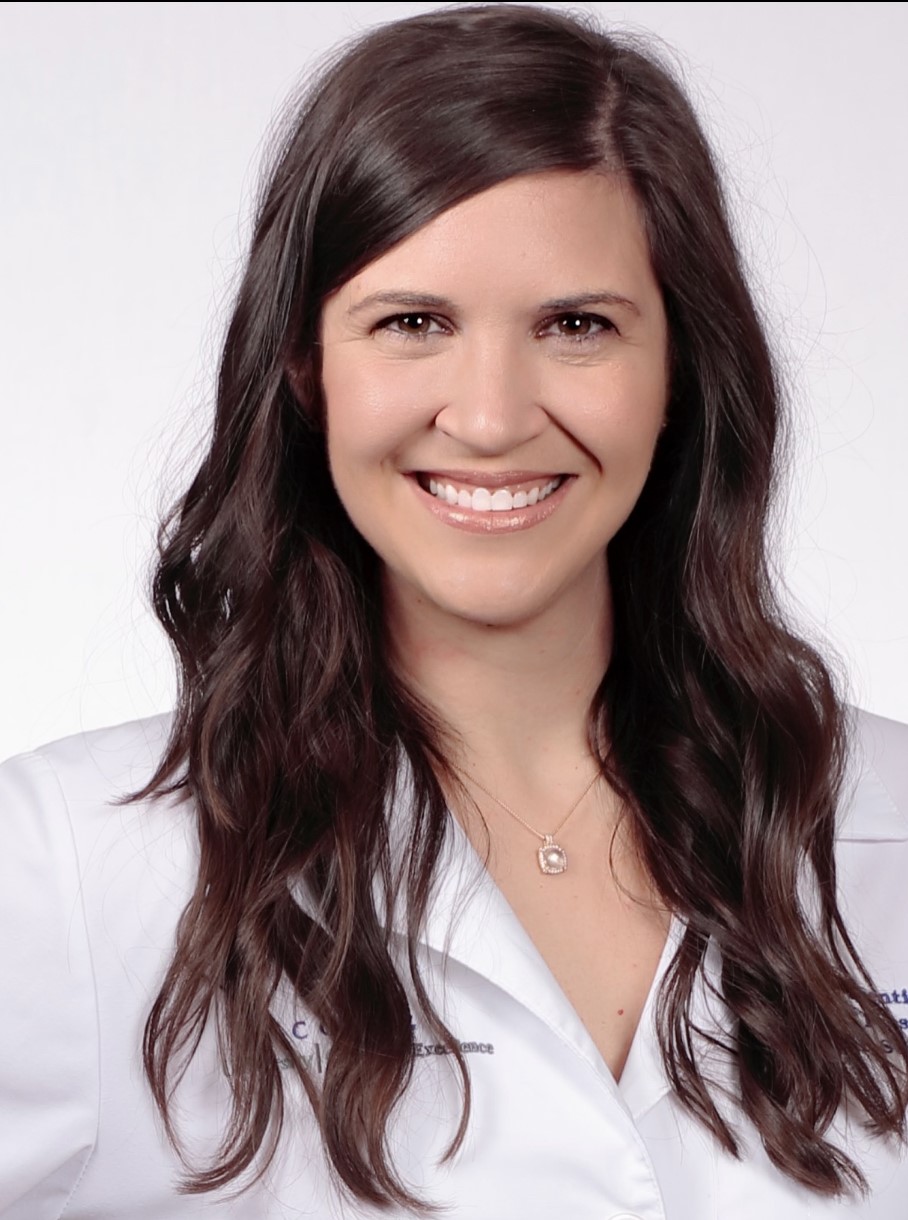
Congratulations to Leigh Ann O’Banion, MD, for being named to the Foundation to Advance Vascular Cures Board of Directors. In addition, Dr. O’Banion was recently appointed Director of Faculty Development at UCSF Fresno. She has an established history as an educational leader at UCSF Fresno, starting with completing surgery residency here before returning as faculty in 2017. She has won research and teaching awards, developed the CHAMPIONS program for vascular disease awareness and care in underserved populations, and currently serves as one of our SJV PRIME student Coaches.
Photo credit: UCSF
Kudos to SJV PRIME student Alli Gomez, for being named one of two recipients of the 15th annual UC President’s Award for Outstanding Student Leadership. The committee was especially impressed with Alli’s leadership in advancing anti-oppression, diversity, equity and inclusion in medical education and patient care at UCSF’s campuses in San Francisco and Fresno.
Congratulations to Eyad Almasri, MD. Dr. Almasri was named to the California Institute for Regenerative Medicine Board.
The Fresno County Rural Mobile Health Program, sponsored by the Fresno County Department of Public Health and includes UCSF Fresno Mobile HeaL, was selected as a winner of the California State Association of Counties (CSAC) 2024 Challenge Awards. The Challenge awards recognize innovative programs in California’s counties. More than 400 entries were submitted this year by various counties in California. Kudos to the Fresno County Rural Mobile Health Program for being one of 16 programs honored.
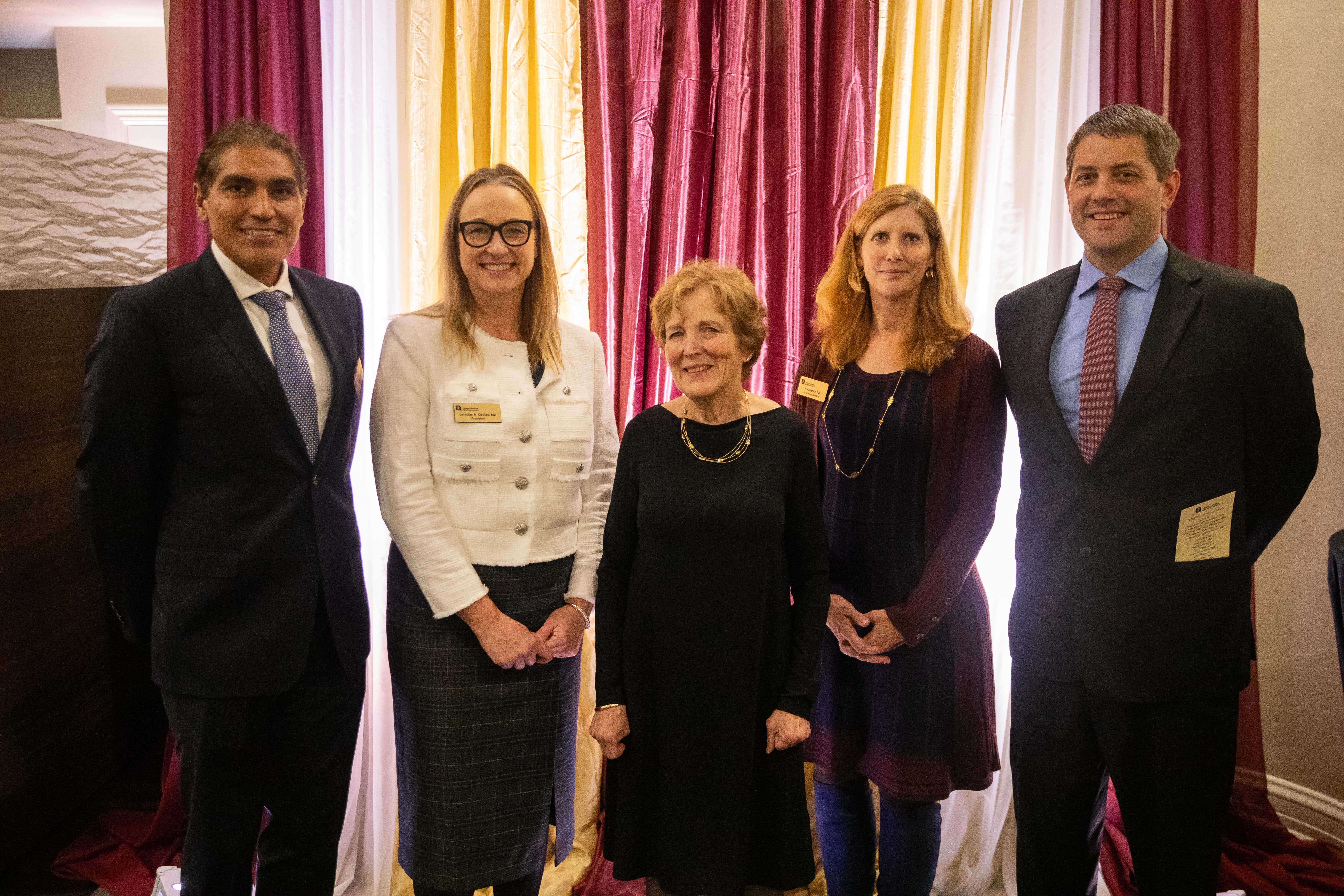
Photo credit: FMMS
Kudos to Gregory Simpson, MD. Dr. Simpson was installed as the Fresno Madera Medical Society’s President-elect and will take office in 2026.

